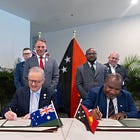Coalition Pushes Nuclear Energy Despite Unfinished Policy Review, Senior MPs Break Ranks on Climate Targets
This piece is freely available to read. Become a paid subscriber today and help keep Mencari News financially afloat so that we can continue to pay our writers for their insight and expertise.
Today’s Article is brought to you by Empower your podcasting vision with a suite of creative solutions at your fingertips.

The Coalition has reignited debate over nuclear energy in Australia despite voters rejecting the policy at May’s federal election, with Shadow Energy Minister Dan Tehan declaring nuclear must be part of the country’s energy mix even as party colleagues signal divergent views on how to proceed.
Tehan told ABC’s 7.30 program Thursday night that his recent visit to U.S. nuclear facilities convinced him Australia needs nuclear power to seriously reduce emissions, though the Coalition has not completed its formal energy policy review.
“What I’ve been hearing and what I saw while I was over in the US visiting large national laboratories at Idaho and Oak Ridge is basically a nuclear renaissance,” Tehan said. “I have a very, very strong view that nuclear has to be part of our energy mix here in Australia if we are going to be serious about reducing emissions.”
The comments prompted immediate pushback from Environment Minister Murray Watt, who told reporters the May election delivered a clear mandate against nuclear power.
“The Australian people have spoken,” Watt said. “This was a headline policy at the most recent federal election, and the Australian people voted in favour of a renewable energy future, not a nuclear power future.”
Shadow Treasurer Ted O’Brien defended Tehan’s position in a Sky News interview, arguing the Coalition received no genuine electoral verdict on nuclear because Labor “basically locked Chris Bowen in a cupboard” during the campaign.
“I laugh when I hear the Labor Party saying they’ve got a mandate when it comes to their energy plan, or indeed they say that the Australian people have voted on the nuclear question,” O’Brien said. “They have absolutely no grounds to raise that sort of an argument.”
O’Brien confirmed the Coalition will change its nuclear policy but declined to specify details while Tehan leads the review process.
Truth matters. Quality journalism costs.
Your subscription to Mencari directly funds the investigative reporting our democracy needs. For less than a coffee per week, you enable our journalists to uncover stories that powerful interests would rather keep hidden. There is no corporate influence involved. No compromises. Just honest journalism when we need it most.
Not ready to be paid subscribe, but appreciate the newsletter ? Grab us a beer or snag the exclusive ad spot at the top of next week's newsletter.
“There is no doubt that we are looking at changing the nuclear policy,” O’Brien said. “But I don’t want to pre-empt in what way that will take place. Dan Tehan’s doing a great job at leading the charge in that regard.”
Liberal Senator Maria Kovacic revealed evolving thinking within Coalition ranks during an ABC Afternoon Briefing interview, distinguishing her current position from post-election criticism of the party’s nuclear stance.
“Let me be clear about what I spoke about,” Kovacic said. “I spoke about the policy that we took to the last election, which related to state-owned nuclear power plants around our country. I don’t believe that that is something that Australians considered to be a credible policy.”
Kovacic said she now supports lifting the nuclear moratorium to allow market forces to determine viability of emerging technologies, a notably different approach from the government-funded reactors the Coalition proposed at the election.
“As a Liberal, I believe that we should allow markets to make a determination about any emerging technology or opportunity,” Kovacic said. “If the market sees that there are some viable emerging technologies in relation to nuclear, then that’s something that we would look at.”
The senator emphasized the policy development process remains ongoing despite Tehan’s public declarations.
“We haven’t determined what our policy is yet,” Kovacic said. “Our leader, Susan Lee, has been very clear that we are going to listen, we’re going to learn, and then we’re going to develop policies that will be something that we can take to the next election.”
When pressed on whether Tehan had prematurely concluded nuclear should be included before completing his review, Kovacic deflected.
“I’m not going to reflect on what somebody else is thinking, and I don’t think you can expect me to do that,” she said. “What I’m telling you is what our process is, and we are undertaking that process in a very clear and transparent way.”
Shadow Education Minister Jonathan Duniam told ABC Afternoon Briefing that Tehan’s public commentary represents legitimate policy exploration.
“I think that what he’s doing is a very fair enough exercise,” Duniam said. “He’s actually ventilating a number of the things that he’s thinking about, working on, reading about, researching.”
Duniam said he tends to agree with Tehan’s assessment that nuclear should be considered if the Coalition is serious about net zero and reducing power prices.
“If we’re serious about net zero, if we’re serious about bringing down power prices, then why wouldn’t we have this at least as part of our mix?” Duniam said.
Assistant Social Services Minister Jed Carney questioned the Coalition’s commitment to climate action and dismissed nuclear as viable.
“First of all, is the coalition committed to net zero or not,” Carney said. “There seems to be some debate there, like people are saying that people would leave the front bench if there was a commitment to net zero.”
Carney characterized Tehan’s enthusiasm for small modular reactors observed in the U.S. as misplaced, noting the technology remains untested.
“He’s all a bit of fluster about what he saw in America,” Carney said. “Got very excited about, once again, the old trope about nuclear micro reactors. They’ve never ever really got it together or got there. They haven’t even been tested yet. These things that he saw in America are yet to be tested.”
The timeline challenge for nuclear deployment emerged as a central point of contention. With coal-fired power plants exiting the grid over the next decade, critics questioned whether nuclear facilities could be constructed quickly enough to serve as replacements.
Kovacic declined to address the 10-year timeline issue directly when questioned on ABC Afternoon Briefing.
“That’s a characterisation that you’ve made about what our policy may or may not look like,” she told host Mel Dalziel. “If you want to continue that conversation, I suggest you have Dantene on your show.”
Duniam acknowledged timeline realities make gas an essential transitional fuel.
“There are some realities around the timelines for commissioning such energy generation, which is why gas is an important part of the mix,” Duniam said. “Gas is something we will, I’m sure, see as part of our energy mix in the policy we present to the Australian people.”
O’Brien drew connections between nuclear energy and the AUKUS submarine program, arguing civil nuclear capability is essential for the defense partnership’s success.
“If you think of what other countries also have nuclear propelled submarines, Australia will be the seventh nation to adopt these submarines,” O’Brien said. “All six other existing nuclear submarine nations have vibrant civil nuclear programs. In other words, they have nuclear energy. The two sectors work hand in glove.”
He emphasized that nuclear energy serves dual purposes beyond electricity generation.
“If we want AUKUS to be a success here in Australia, we must have nuclear energy, not just for the sake of our electricity, our energy needs, for industry and the like, but in order for AUKUS to be a success, nuclear is an absolute imperative from a civil program perspective,” O’Brien said.
The Shadow Treasurer cited International Atomic Energy Agency data showing nearly 60 countries introducing or considering nuclear energy for the first time.
“Here you have an advanced technology which is proven to work,” O’Brien said. “It can provide base load power. It can keep the lights on. It’s completely reliable. And yet still in Australia, the Albanese government is insisting that it should be illegal.”
National Senate leader Bridget McKenzie told television Thursday morning that nuclear policy will not rank among the top five reasons for the Coalition’s election defeat when reviews are completed.
“I think when the reviews are all handed in our nuclear policy won’t be in the top five reasons of why we had such a catastrophic loss at the last election,” McKenzie said. “But the reality remains that if you want to be serious about reducing emissions that nuclear has to be part of the mix if we’re going to stay a rich and prosperous country.”
O’Brien also addressed fiscal policy, characterizing the Albanese government as the biggest spending administration in decades when pandemic measures are excluded.
“Ever since the Hawke government, treasurers have had rules which basically constrains their spending,” O’Brien said. “Jim Chalmers is the exception. Anthony Albanese has allowed him to have no rules whatsoever.”
He outlined two spending control priorities should the Coalition return to government: introducing fiscal rules and conducting line-by-line budget reviews.
“You look line item by line item and you ask yourself the question, is this the right spend? Can it be done more efficiently?” O’Brien said. “This is the thing that this government is not doing and the coalition must.”
On questions about internal party dissent, O’Brien defended colleagues expressing divergent views on climate policy.
“This is the Liberal Party, though, and I’m proud of that, for one,” O’Brien said when asked about critics suggesting some MPs undermine leader Susan Lee. “I think this is why we always are better in government, we are always better with policy, because we have the robust debate.”
Watt emphasized government advice consistently identifies renewable energy backed by gas and batteries as the cheapest new power option.
“What we consistently get advice on as governments is that the cheapest form of new power that we can possibly provide is renewable power backed up by gas and backed up by batteries,” Watt said.
The renewed nuclear debate positions energy policy as a central battleground for the 2028 federal election, with the Coalition signaling willingness to prosecute the issue again despite May’s electoral setback. The party faces internal tension between advocates of market-driven approaches to lifting the nuclear ban and those supporting more direct government intervention in nuclear development.
Whether the Coalition can reconcile these different visions into a coherent policy before the next election remains uncertain, with Tehan’s review process continuing amid public commentary from senior party figures expressing competing priorities and timelines.
Sustaining Mencari Requires Your Support
Independent journalism costs money. Help us continue delivering in-depth investigations and unfiltered commentary on the world's real stories. Your financial contribution enables thorough investigative work and thoughtful analysis, all supported by a dedicated community committed to accuracy and transparency.
Subscribe today to unlock our full archive of investigative reporting and fearless analysis. Subscribing to independent media outlets represents more than just information consumption—it embodies a commitment to factual reporting.
As well as knowing you’re keeping Mencari (Australia) alive, you’ll also get:
Get breaking news AS IT HAPPENS - Gain instant access to our real-time coverage and analysis when major stories break, keeping you ahead of the curve
Unlock our COMPLETE content library - Enjoy unlimited access to every newsletter, podcast episode, and exclusive archive—all seamlessly available in your favorite podcast apps.
Join the conversation that matters - Be part of our vibrant community with full commenting privileges on all content, directly supporting The Evening Post (Australia)
Catch up on some of Mencari’s recent stories:
It only takes a minute to help us investigate fearlessly and expose lies and wrongdoing to hold power accountable. Thanks!








